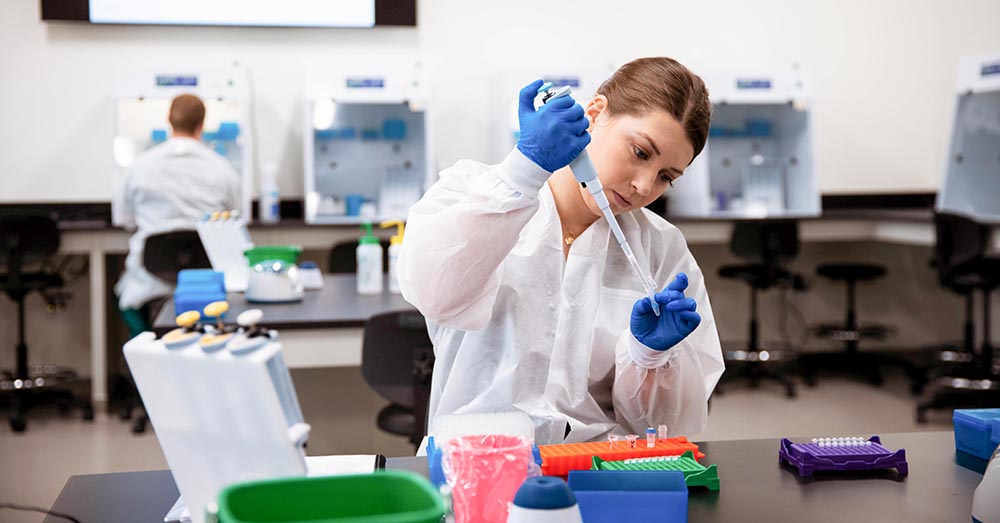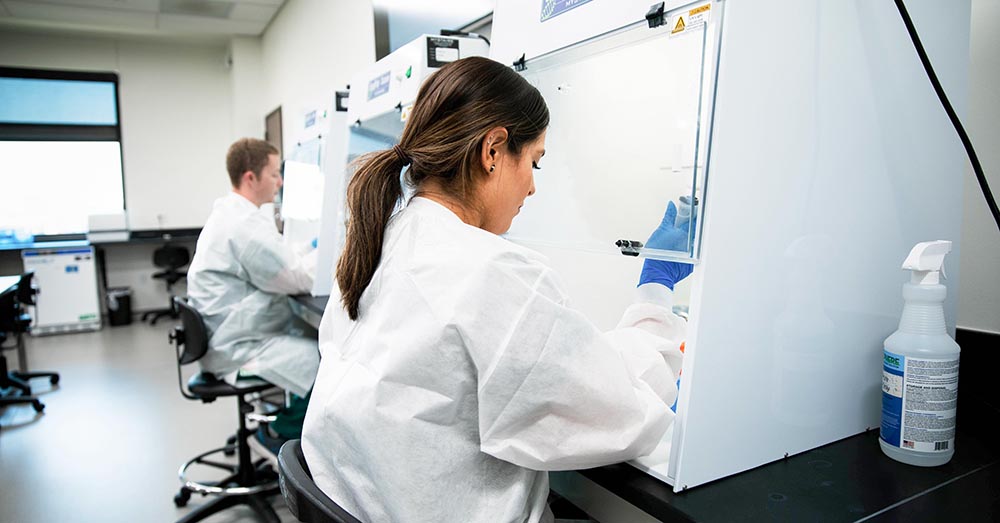What is a Diagnostic Molecular Scientist?
Molecular pathology is an exciting, rewarding, and lucrative career path that plays a crucial role in the fight against COVID-19.

Molecular pathology is playing a key role in the evolution of patient health care. With the study and diagnosis of inherited disease, cancer, and infectious disease, molecular pathology has become the front line in the fight against COVID-19.
We spoke with Ericka Hendrix, Ph.D., MB(ASCP)cm, about the job demands for diagnostic molecular scientists and how the pandemic has affected the role. Hendrix is an Associate Professor and Director of the Molecular Pathology Program in the TTUHSC School of Health Professions.
Roles and Responsibilities of Diagnostic Molecular Scientists
“It’s all very behind the scenes,” Hendrix begins. “Diagnostic molecular scientists typically work in a laboratory that diagnoses diseases based on the DNA and RNA in a sample.”
Samples come from a patient and can be tested for genetically inherited diseases, cancers, and infectious diseases such as COVID-19. Hendrix says that, in recent years, diagnostic molecular scientists have contributed to the pandemic fight by designing new assays. An assay is a procedure or test designed to detect qualitatively or quantitatively the presence, amount, or functional activity of a disease target.
“If a patient has a certain problem, diagnostic molecular scientists can design a test to aid in identifying a cause,” Hendrix explains.
Another career path for diagnostic molecular scientists is to become a DNA analyst for the Department of Public Safety or any entity doing crime scene analysis.
With a large DNA laboratory at the Lubbock DPS, TTUHSC graduates have worked as analysts, processing DNA for various crimes, including cold cases.
Hendrix explains how a physician can give personalized medicine to cancer patients with the help of the lab.
“We can genotype a tumor and let the doctors know if it has a certain mutation to direct which drugs will be the most effective,” she explains.
Molecular Pathology: Flourishing During COVID-19 Pandemic

Hendrix points out that the pandemic has brought an awareness of molecular science to the general population. Before the pandemic, much of the general public had not heard the term PCR. PCR stands for polymerase chain reaction. It’s a test that detects the presence of genetic material from a specific organism, such as a virus like SARS-CoV-2.
“It’s exciting that PCR is common knowledge because it will shed light on what we’re doing in the lab with DNA and RNA,” Hendrix says. “We are in higher demand, and our skillset is now widely recognized.”
Hendrix notes the convenience of home testing but points out that all molecular tests start in the lab, where they go through a complicated refining process.
“The pandemic has really made our field flourish,” she says.
Hendrix tells a story of being contacted by a renowned laboratory after the pandemic hit, asking for 24 diagnostic molecular scientists to employ for PCR COVID-19 testing.
“A high level of expertise is required to perform the tests correctly,” she continues. “Now that there is more knowledge about DNA testing, people are interested in the field, and the salaries have risen.”
Some of the TTUHSC graduates have been hired by companies creating COVID-19 tests that have since been authorized for emergency use by the FDA and are commercially available.
“I’ve been in the field a long time, and it still amazes me,” Hendrix notes. “It’s amazing what we can do.”
Entering the Field of Molecular Pathology
We asked Hendrix what advice she had for those curious about a career in molecular pathology.
“I highly recommend a degree in clinical laboratory sciences, biology or chemistry,” she begins. “And take appropriate classes like cell biology, molecular biology, and genetics.”
She points out that there aren’t many accredited programs in the United States, and few of them are at the Master’s level.
“Our program is a one-year Master’s degree and ends with a rotation at a hospital lab,” she says.
She describes the field of molecular pathology as very fast-paced, but one where you are part of the solution in diagnosing diseases. It is an opportunity to help with the current pandemic and to aid in the more sophisticated treatment of disease.
Related Stories
TTUHSC Receives $1 Million Gift from Amarillo National Bank to Expand and Enhance Pediatric Care in the Panhandle
TTUHSC School of Medicine leaders accepted a $1 million philanthropic gift from Amarillo National Bank on Tuesday (Feb. 10), marking a transformational investment in pediatric care for the Texas Panhandle.
Texas Tech University Health Sciences Center Permian Basin Announces Pediatric Residency Program Gift
TTUHSC Permian Basin, along with the Permian Strategic Partnership and the Scharbauer Foundation, Feb. 5 announced a gift that will fund a new pediatric residency.
The Ph.D. Programs that Shape Health Care
The Graduate School of Biomedical Sciences Ph.D. programs at TTUHSC provide the foundation, mentorship and research opportunities you need to pursue groundbreaking work.
Recent Stories
The John Wayne Cancer Foundation Surgical Oncology Fellowship Program at Texas Tech University Health Sciences Center Announced
TTUHSC is collaborating with the John Wayne Cancer Foundation and has established the Big Cure Endowment, which supports the university’s efforts to reduce cancer incidence and increase survivability of people in rural and underserved areas.
TTUHSC Receives $1 Million Gift from Amarillo National Bank to Expand and Enhance Pediatric Care in the Panhandle
TTUHSC School of Medicine leaders accepted a $1 million philanthropic gift from Amarillo National Bank on Tuesday (Feb. 10), marking a transformational investment in pediatric care for the Texas Panhandle.
Texas Tech University Health Sciences Center Permian Basin Announces Pediatric Residency Program Gift
TTUHSC Permian Basin, along with the Permian Strategic Partnership and the Scharbauer Foundation, Feb. 5 announced a gift that will fund a new pediatric residency.
